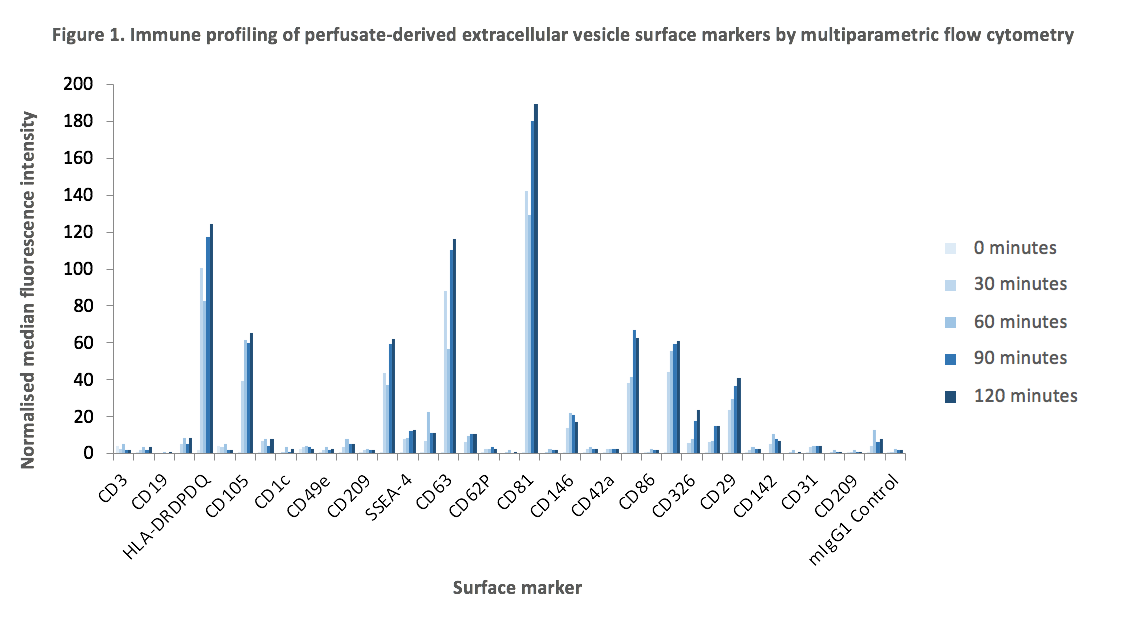Characterisation of Kidney-Specific Extracellular Vesicles During Isolated Organ Normothermic Machine Perfusion
1Department of Surgery, University of Cambridge, Cambridge, United Kingdom, 2Department of Veterinary Medicine, University of Cambridge, Cambridge, United Kingdom
Meeting: 2022 American Transplant Congress
Abstract number: 1299
Keywords: Epitopes, FACS analysis, Machine preservation, Perfusion
Topic: Basic Science » Basic Science » 16 - Biomarkers: -omics and Systems Biology
Session Information
Session Name: Biomarkers: -omics and Systems Biology
Session Type: Poster Abstract
Date: Monday, June 6, 2022
Session Time: 7:00pm-8:00pm
 Presentation Time: 7:00pm-8:00pm
Presentation Time: 7:00pm-8:00pm
Location: Hynes Halls C & D
*Purpose: Introduction: Normothermic machine perfusion (NMP) can evaluate and recondition deceased-donor kidneys but accurate biomarkers are needed to assess organ quality and to predict post-transplant organ function. Extracellular vesicles (EVs) are membrane-delimited microparticles released by all cells and represent ideal targets for biomarker development as they reflect the conditional state of tissues and organs.
*Methods: A donation after brainstem death (DBD) kidney declined for transplantation was subjected to NMP at 36 °C for two hours and perfusate and urine were sampled at 30 minute intervals. EVs were separated using size exclusion chromatography and were characterised by nanoparticle tracking, western-blot and gold-immunolabelled transmission electron microscopy (TEM). Multiparametric flow cytometric (FC) analysis of characteristic surface epitopes and non-labelled mass spectrometry (LC-MS/MS) to identify enriched EV protein markers and associated molecular pathways was performed.
*Results: Separated EVs had mean concentration of 4.36×108-6.61×109 particles/mL and mean size of 130-145nm. Western-blot confirmed the presence of EV associated proteins (CD81, CD63) and TEM showed microparticles consistent with exosomes. FC revealed EV surface upregulation of MHC class II (HLA-DR/DP/DQ), lymphocyte (CD24, CD44), endothelial cell proliferation (CD105), and integrin (CD29) markers during NMP (Figure 1). Proteomic analysis identified 563 proteins in kidney EV cargo, including 75% of the top EV proteins in Vesiclepedia. EV origin was demonstrated through detection of kidney derived markers MME, NHE-RF1/RF3, PODXL, SLC12A1/NKCC2, and AQP1. Gene Ontology analysis associated cellular components to vesicle membranes and KEGG database analysis revealed vesicular proteins were involved in G-protein-coupled receptor signalling and cation homeostasis. Proteomic analysis confirmed EV MHC upregulation during NMP.
*Conclusions: Kidney NMP facilitates isolation and characterisation of tissue-specific EVs which is essential for EV-derived biomarker development in kidney transplantation. EV subpopulation and cargo analyses during NMP may enable assessment of the conditional state of donor organs and provide mechanistic insights into cellular pathways for therapeutic manipulation.
To cite this abstract in AMA style:
Ashcroft J, Williams TL, Elliott TR, Marton A, Hosgood SA, Nicholson ML, Kosmoliaptsis V. Characterisation of Kidney-Specific Extracellular Vesicles During Isolated Organ Normothermic Machine Perfusion [abstract]. Am J Transplant. 2022; 22 (suppl 3). https://atcmeetingabstracts.com/abstract/characterisation-of-kidney-specific-extracellular-vesicles-during-isolated-organ-normothermic-machine-perfusion/. Accessed January 31, 2026.« Back to 2022 American Transplant Congress

